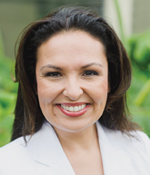Today’s session “Harnessing the Electronic Health Records in Respiratory Disease” will offer attendees a better understanding of the challenges and opportunities for patient care using EHRs and how EHRs can be integrated within clinical respiratory practice and research.
The symposium, which is geared toward clinicians, nurses, health services researchers, and administrators, will be from 8:15 to 10:45 a.m. in Sapphire Ballroom C/D/G/H (Level 4) Hilton San Diego Bayfront. The program is sponsored by the ATS Assembly on Behavioral Science and Health Services Research and the ATS Assembly on Nursing.

Andrea Apter
“Part of the push for EHRs is to allow patients to communicate with their providers and to have greater access to their medical records,” says Andrea Apter, MD, MA, MSc, the session co-chair and professor of medicine and chief of the Section of Allergy and Immunology in the Division of Pulmonary, Allergy, and Critical Care Medicine at the University of Pennsylvania, Philadelphia.
The rollout of the American Recovery and Reinvestment Act of 2009 has brought a number of provisions related to the use of the electronic medical records.

Melissa Valerio
“We thought it was important to pull a panel together to address the needs of patients and identify how patients, health care providers, and researchers may use EHR information in managing illnesses, specifically respiratory health care needs,” says Melissa Valerio, PhD, MPH, session co-chair and associate professor of health promotion and behavioral sciences at the University of Texas School of Public Health, Houston.
This includes the ICU, nursing and team communication, and the outpatient setting, Dr. Apter adds.
Under a unique session format, speakers will provide the pros and cons for several EHR topics. Presentations include:
- Meaningful Use and the EHR: Setting the Stage
- Using the EHR for Patient-Reported Outcomes: U.S. and International Case Studies
- Can EHR Help Overcome Language Barriers as a Strategy for Patient Education?
- How Best to Use the EHR for Outpatient Communication: Just Ask Patients and Their Providers
- Opportunities for and Issues Surrounding Use of EHR for the Interdisciplinary Team
- The EHR and Communication in the ICU: The Good, the Bad, and the Opportunities
“We’ll look at how the EHR may inform self-management within the clinical setting and at home,” Dr. Valerio says.
Dr. Apter notes that she conducted patient focus groups in which she found that patient familiarity with the EHR and patient portals depend in large part on the provider’s familiarity with the EHR.
“This is a huge opportunity that shouldn’t be missed, but one has to be cautious because one doesn’t want to have the EHR limit access to certain groups of people or to take away from actual safe communication between patients and physicians, but sort of use the EHR to overcome barriers,” Dr. Apter says.
